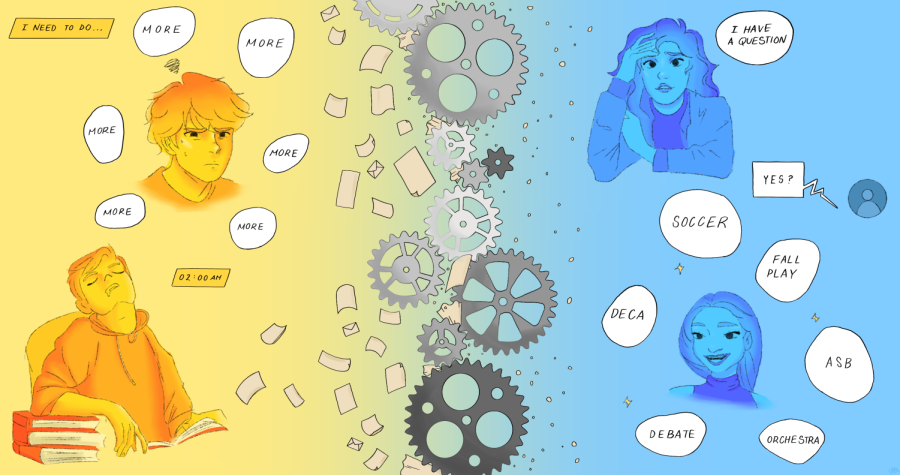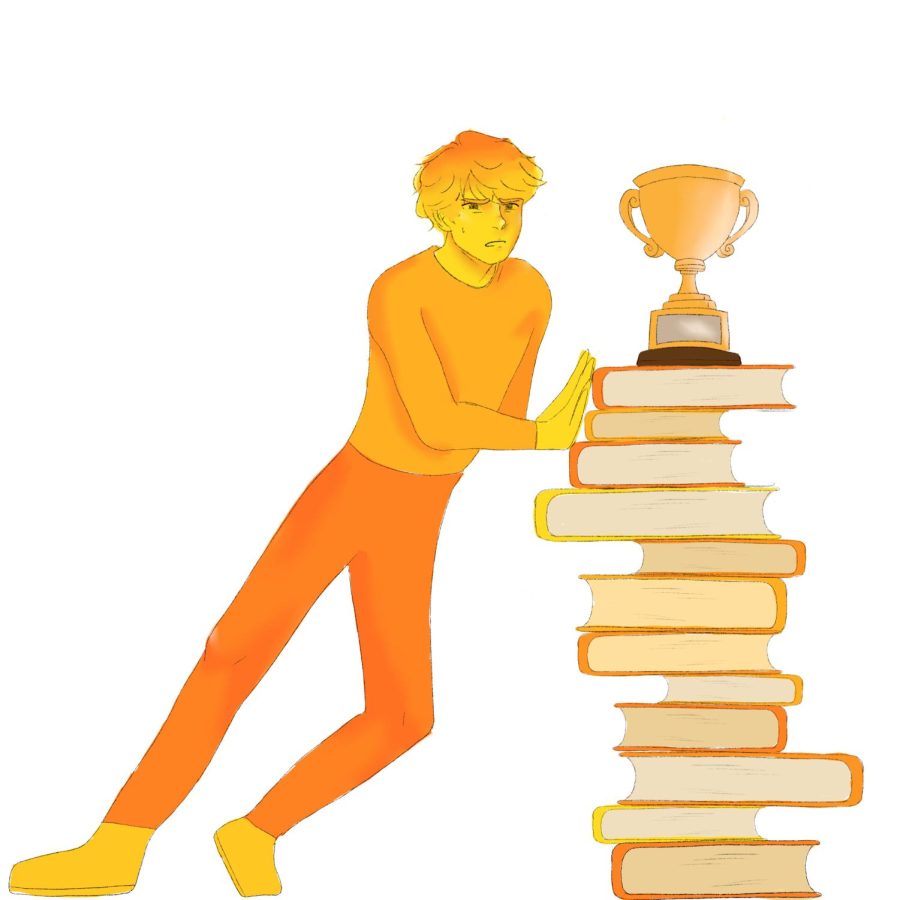Illustration by Anika Mantripragada
Perspectives: Does grind culture provide gain or strain?
February 24, 2022
Grinding to a halt: Pushed past our limits
“I got three hours of sleep last night,” a girl two sofa seats to the right of me whispers to her friend during an after-school Journalism workshop. My mind flashes to the @harkersleeps Instagram account, which features over 30 images of different students catching some much-needed rest throughout the school day. For freshmen, sophomores, juniors and seniors alike, the feeling of being overworked is mutual.
I attribute this issue to the idea of “grind culture,” the general atmosphere that compels students to add more and more to their academic and extracurricular responsibilities. This grind culture creates a toxic environment where students are pressured to push themselves past their limits often caused by peer, parent or self-induced expectations.
According to Harker Aquila’s Instagram poll, out of 101 upper school students who responded, 74% said they felt negatively pressured by their peers or parents to push themselves academically or non-academically.
But where does this feeling come from? As one of the major K-12 college prep schools in California’s tech-focused Silicon Valley, it’s no surprise that Harker has this environment that feels like it’s constantly weighing and wearing students down. Opportunity-oriented parents also set high expectations and pressure students to continue adding responsibilities in the form of advanced classes or outside activities. However, students, too, play a massive role in shaping the culture at Harker.
During the several months I’ve been at Harker’s upper school campus, I’ve seen and heard countless examples of kids comparing themselves to others, bragging about their extracurriculars or discussing grades with their friends and being teased for it.
Students have casual conversations trying to outdo one another for the most challenging course load or the fewest hours of sleep, thus normalizing the grind culture and constant academic stress. This idea of pushing yourself to become better than your peers or a cookie cutter applicant for Ivy Leagues has become ingrained in students’ mindsets. From the same poll on Harker Aquila’s Instagram, out of 108 upper school students, 91.67% compared themselves to their peers at Harker somewhat often or very often.
When students prioritize sleep instead of studying, they fall behind on homework and assignments. This balancing act of self-care and the pursuit of the perfect report card has often forced me to overlook learning content in favor of finishing homework. However, if students do focus on finishing an assignment rather than sleeping, they show up to school the next day poorly-rested and unfocused, which hurts their academic performance according to the American Psychological Association.
Though some say the grind culture can prepare students with necessary life skills for college and beyond, this statement only applies up to a certain level of difficulty. Once students feel adequately challenged with their course selection, why should they feel the need to add on another Advanced Placement (AP) class or start a nonprofit organization just for the sake of college applications?
Sometimes, when there’s nothing to talk about with my parents, conversations inevitably float to college applications. My mom asks me if I’ve started coming up with ideas for a nonprofit organization that would benefit the unhoused or start a drive to collect toiletries for people living in shelters. Even though I know her goal is to help me succeed, I can’t help but question my self-worth and my academic load: Am I not doing enough? Why can’t I handle as many extracurriculars and AP classes as my peers? Why can’t I be more productive with my time?
Often students pick extracurriculars with the hope that it will bring them more opportunities, but these added activities can also become sources of extra stress. Although their intentions might come from a good place, extrinsic motivation from friends or parents can act as long-term negative reinforcement, potentially teaching students to rely on an extrinsic reward for learning, like a grade, rather than learn because it is enjoyable.
Ultimately, because the concept of a grind culture stems from both external and internal sources, there are a variety of ways to alleviate this issue. As students, we can assess if the extracurriculars or academic courses we participate in truly benefit us or not and try to have more productive conversations with parents about our course loads. We need to choose activities and courses that are for us, not for a college admissions officer or our parents.
Grind culture’s stifling grip on Harker has lasted for too long.
Rise and grind: preparing for the future
Out of the corner of my eye, I notice a line of students form at the teacher’s desk. They shuffle forward, one by one, as they sort out their doubts and inquiries no matter the number of them. Rarely did I see one of my peers hesitate to ask a question as requesting help wasn’t judged nor looked down upon.
I brought up this aspect of Harker to my cousin, who attends a school with a less stressful, rigorous environment. To my surprise, he explained that he hardly sees his peers ask teachers for help. He follows the same trend because he feels as though consulting a teacher for help carries a level of stigma with it.
Strong student-teacher relationships at Harker are a direct result of our intensive, competitive environment dubbed as grind culture. The difficulty of our courses compel us to ask our teachers for assistance when needed, creating a community where requests for help aren’t shamed. The comfortability is only one of the many positives of grind culture, and I’ve noticed over the years that students, including myself, only acknowledge the faults with grind culture and disregard the benefits as they only fully appear later in life.
For one, the competitive atmosphere encourages students to push themselves, and as a result, leads them to learn more about studied topics. A study by Raphaël Le Bouc and Mathias Pessiglione investigating effects of a classroom competition found that it boosted student performance. Bouc and Pessiglionie also discovered a rise in participants’ physical effort and motivation, such as in athletics. Personally, Harker’s competitive environment is benign as it encourages collaboration and motivates me to make more effort in my classes, but when I’m struggling, I can always contact a peer for help. I’ve found a majority of my friends at Harker simply through helping others out or receiving assistance academically. Sometimes just discussing challenges or difficulties regarding school results in bonding with my peers.
As I began challenging myself with higher level courses and an increased number of activities, I’ve felt more comfortable asking my teachers for help and attending their office hours. A couple years ago, I would have scoffed at the idea of doing so due to the less intensive atmosphere I learned in as well as the easier courses I took. A study by the American Psychological Association (APA) reported that close teacher-student relationships result in a higher attendance rate, more collaboration, increased learning engagement and further developed social skills, producing an overall improved academic performance and school experience. When I ask a teacher for help, I feel more at ease with the class and I can fully enjoy the subject since lack of support isn’t an issue. Through attending office hours, I start to grasp the material more easily and don’t have to constantly worry about falling behind.
These close links between teachers and students also cut high school dropout rates by half as students receive emotional support from their teachers. Harker blocks out time for a minimum of five 20-30 minute office hour sessions per five-day school week, providing opportunities to request teacher assistance even for students with multiple commitments.
While I don’t take advantage of as many office hours sessions as I should, by increasing the number of times I go, I’ve created a more beneficial academic world for myself. The positive high school experience teachers contribute to now through their assistance and support will lead students to carry a positive mindset with them while moving towards college and the workplace.
Entering high school, I didn’t follow a schedule and I had poor organizational skills. Shortly after, my classes’ difficulty urged me to develop management strategies. Without the rigorous workload and classes at Harker, I wouldn’t have done so since Harker’s academic environment requires students to remain focused, create schedules and learn organization skills to thrive. These managing skills will become particularly useful when entering college or starting a career, so why not start planting those seeds of success now?
Outside of course load, grind culture compels students to enter more activities and enables them to find their interests in topics such as athletics, STEM and performing arts. As they narrow down their options, students begin taking on leadership roles in these areas through clubs and extracurriculars. Without the push to venture out of their comfort zones, students would find it more difficult to locate a passion. Harker’s introduction to a heavy workload in high school better prepares students for college and the workplace where the atmosphere is much more hectic.
While Harker encourages students to partake in more opportunities, students who stretch themselves too thin will experience the well-known negatives of grind culture such as waning mental health and increased stress, but how did this pressure to participate in every available activity arise? Well, it stems from the rumors we spread across campus such as how students must enroll in 20 Advanced Placement (AP) classes and participate in equally as many clubs for colleges to even consider accepting them. The transmission of these rumors creates the false mindset that students must overschedule themselves to succeed, which as a result, diminishes enjoyment associated with school. If we discontinue propagating these rumors, we can all contribute to and experience a much more positive version of grind culture while mastering the mentioned abilities that it teaches us.
These various skills aren’t taught in classes, they’re taught through experience, which is precisely what grind culture provides for students. Despite acting as a stress inducer, Harker’s unique environment enables students to take these fully developed skills and utilize them to excel and thrive in the future as they graduate and enter the workplace.


